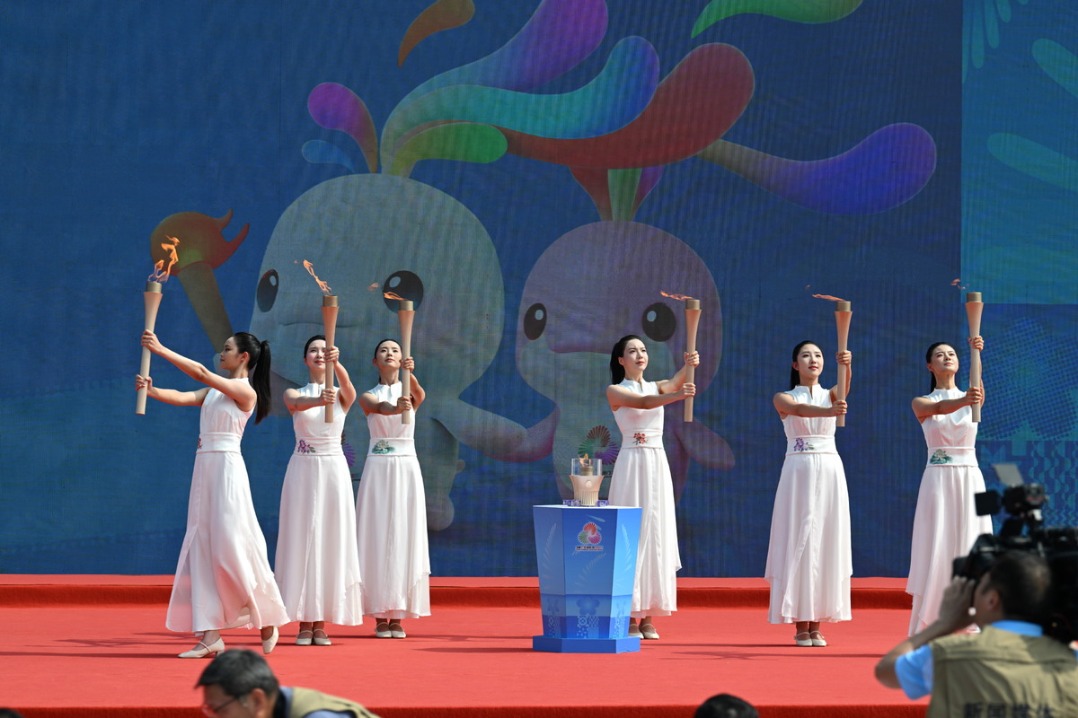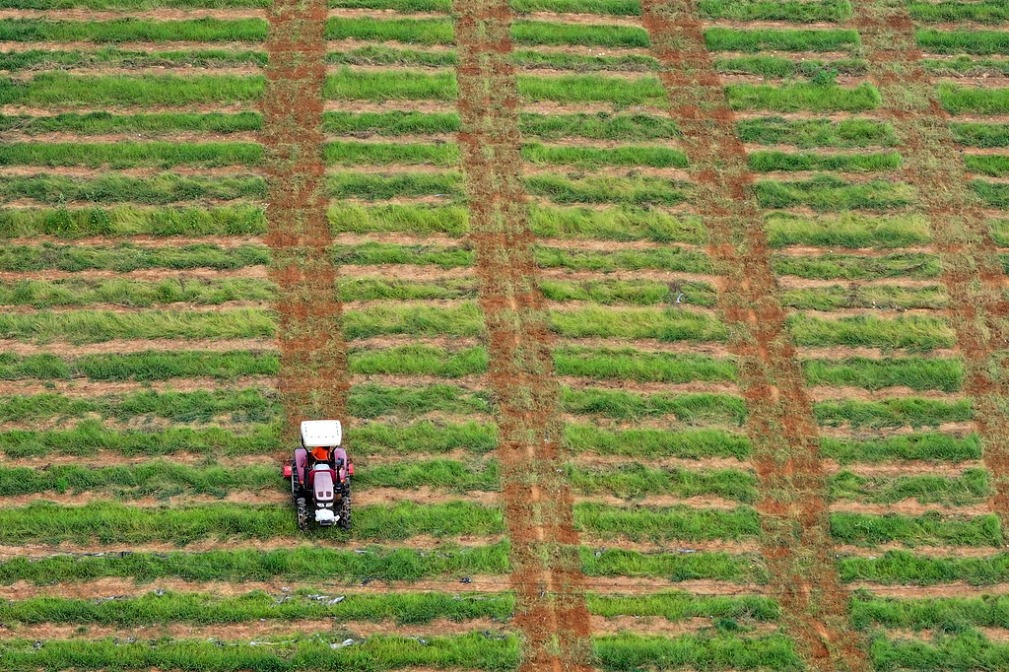Children's poems carve out a legacy
Project puts verses sent from all over the world onto beach rocks, Deng Zhangyu reports.

Walking along the picturesque shores of Dongshan Island, in southeastern China's Fujian province, visitors can immerse themselves in a poetic world brimming with vivid imagination and bold creativity, encountering children's poems engraved on the coastal rocks.
The verses range from the imaginative musings of a child who writes: "A cloud has little strength, yet in one burst, can fling a bolt of lightning", to the philosophical reflections of another who pens: "My two hands empty, can still hold back the wind", and "The compass points south, and the north is forgotten".
These poems come from the Dongshan Island International Children's Poetry Beach Project, an annual art program inaugurated on June 1, International Children's Day, with a two-day celebration that included an awards ceremony, poetry readings, outdoor performances, workshops and educational activities, aiming to build the idyllic island into a cultural landmark.
"Poetry is a counter to cliches. It's also a bridge that empowers people around the world to transcend their native languages and cultures, rebuilding the Tower of Babel. I hope to create a potential world cultural heritage here through the power of art. Many years from now, when we are no longer here, this poetry beach will still remain," says Qiu Zhijie, vice-president of the Central Academy of Fine Arts who initiated the project.
Since last September, the project supported by local government has been inviting children from around the globe to submit their poetry, with selected works being engraved on the island's coastal rocks. It has received more than 5,000 submissions from children under the age of 16 from various countries, including the United States, France, Germany, Argentina, Mexico, Japan and South Korea.
A panel of judges, consisting of artists, poets, translators and educators, selected 500 poems to be carved onto the seaside rocks. The entire carving process is arduous, requiring significant time and effort from numerous workers who must transport machinery to the shorelines and continue carving day and night. Approximately 400 poems have been completed since the beginning of this year.
In China, engraving poems on rocks has long been a cultural tradition known as cliff inscriptions, typically the domain of cultural luminaries. This project, however, gives the honor to children, who are "natural poets" in Qiu's eye. For children, poetry is a native language, a spontaneous expression of their encounters with the world. They use simple and imaginative words to describe the world.
Qiu often bursts into laughter and is sometimes moved by the children's poetry submissions. He recalls a poem written by a young girl whose father was a migrant worker: "Dad rose from the bamboo mat. His skin adorned with woven art. In time, the patterns slipped away. Back to the mat, they chose to stay, for they did not want to wander far, like stars."
"Children's poetry is the least controversial and the most universal. You see, they write about nature, animals, parents, the sun, the moon, and white clouds. It is best suited to build a platform for global and cross-cultural communication," explains Qiu on why he chose children instead of adults.
The youngest participants of the project are only 3 years old, and their poetic words were recorded by their parents. Children's poetry from both China and abroad generally shares similar themes, such as a mother's love and the inspiration drawn from nature. However, foreign children tend to write more about sports, like soccer, and puppy love, while Chinese children write less about these topics, says Lan Lan, a renowned poet who is a member of the judge panel.
Last June, Lan Lan began helping to collect children's poetry internationally, mainly with assistance from her circle of international poets and some literature teachers. The most impressive thing was that she received a brilliant poem from a child in Chile. However, when she tried to contact the young writer, she was unable to do so because the child's family were refugees, displaced from their homes.
"Writing poetry is of great significance to children's growth and future. A child's world is small and offers limited choices, but writing poetry can provide them with an emotional outlet, helping them realize their potential and value," says Lan Lan, who has also been active in modern poetry education for children for years.
Song Yumo, a mother of a 10-year-old girl from Shenzhen in Guangdong province, took her daughter to visit the poetry beach on June 1. A poem written by one of her daughter's classmates was engraved on a rock.
"After seeing the rocks, my daughter told me that she would have her poetry engraved on rocks here one day," says Song, adding that her daughter has kept writing poems for months.
In the eye of poem translator George O'Connell, the feeling of being recognized is very important for children. Through their own creations, children can also gain the recognition and respect of others, which is crucial for their mental health.
"The project is rewarding children and giving them public recognition. That's very important. These little poets are clever, have good skills and talent. Their poetic creations give us a way to see the world," says O'Connell, who helps translate the Chinese children's poetry into English with his wife.
To write poetry is not easy in an era when people's attention spans are easily captured by the internet and electronic devises, O'Connell says. Poetry creation requires engaging in high-level intellectual activities, "a process of composition drawing on the imagination and the brain, rather than being reduced to what the camera can capture".
While writing is not easy, gathering the poetry of children from around the world on such a large scale and engraving it onto rocks through the art of calligraphy on a beach is also difficult.
Qiu, also a renowned contemporary artist whose works often focus on Chinese characters and calligraphy, receives assistance from his students at the Central Academy of Fine Arts in Beijing. His team designs each poem's carving style and the calligraphy used to write them, transforming them into works of art rather than just poems.
The artist advocates art in daily life. His previous projects include holding a calligraphy exhibition in a food market in Beijing and a labor-intensive project of copying a fourth-century Chinese calligraphy work more than 4,000 times on the same paper over seven years.
The children's poetry beach is an ambitious vision that Qiu sets for Dongshan Island to become a sanctuary for artistic healing, particularly tailored for individuals grappling with depression. The therapeutic power of poetry and art, coupled with the island's natural elements — soothing sea breezes, rhythmic waves, and abundant sunlight — creates an ideal environment for mental rejuvenation.
Plans are also underway to establish a poetry library on the island, curating a global collection of poetic works. This initiative aims to harness the healing potential of the arts, offering a serene retreat for those in need of solace and inspiration, says Qiu.
After workers began their carving at the beginning of this year, more and more tourists have been coming to the little island, despite its inconvenient transportation. On weekends, many visitors flock to the island to enjoy discovering interesting poems on the rocks, providing a strong boost to local tourism.
"Our project is not just an art festival; it is also a long-term educational and community-building initiative. Through poetry and art, we also aim to inspire the creativity of children, foster community development, and make a different in the future," says Qiu.







Today's Top News
- Latest plan to realize Gaza ceasefire: Step toward peace or temporary truce?
- China leads by example on Global South climate action
- Xi to attend opening ceremony of the Global Leaders' Meeting on Women, deliver keynote speech
- China records surge in holiday travel during the eight-day break
- Deep understanding leads to trust in China
- China imposes export controls on rare earth technologies






























